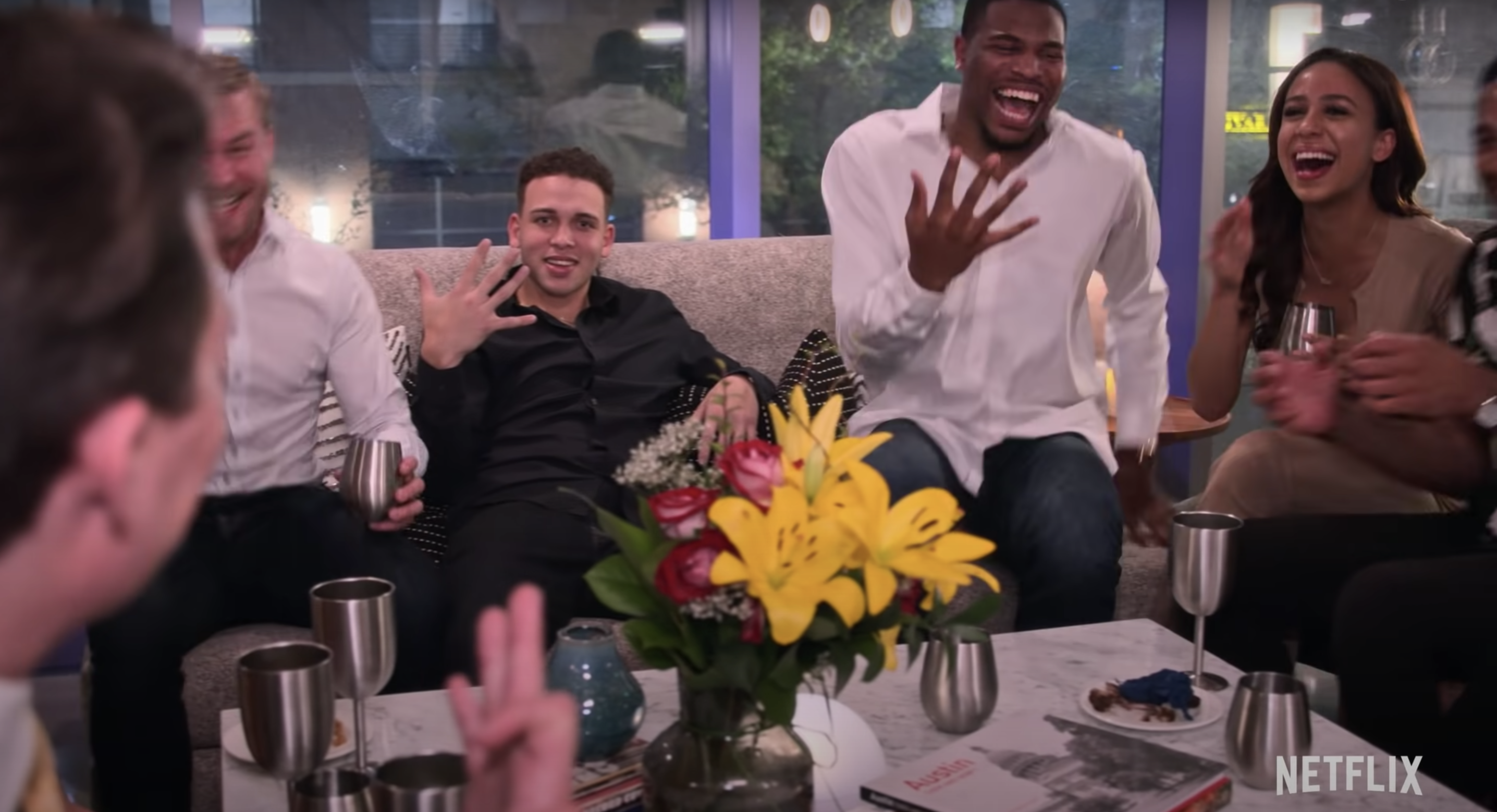Love in the Time of Reality Television

Image description: Participants on Netflix’s “The Ultimatum” hold up their hands while celebrating their last night together with their original partner.
Image credits: Screenshot from “The Ultimatum” on Netflix
We all grow up wanting to love and be loved. Whether we see healthy representations of it during childhood or develop our own definitions of love through life experiences, love motivates us to reach beyond the boundaries of self and become the people we aspire to be.
One of love’s most outstanding qualities is its timelessness. We can observe the inspiring powers of love throughout the entirety of culture, history, and literature. Paris of Troy’s love for beautiful Helen of Sparta triggered the infamous Trojan War of Greek mythology; Henry VIII repudiated and reformed the entire Catholic Church just to marry Anne Boleyn in the 1500s; Jay Gatsby of F. Scott Fitzgerald’s “The Great Gatsby” uproots his entire life because of his love for the enigmatic Daisy Buchanan. Love seems to be a force that withstands time, its definition constant and unchanging.
However, romance in the 21st century is undergoing a paradigm shift, as its intersection with mass media and popular culture is reframing the way that we perceive and experience intimacy. Reality TV shows centered on love like “The Bachelor,” “Love is Blind,” “The Ultimatum,” “Are You The One?,” and “Married at First Sight” are transforming the notion of love in every dimension – specifically with regards to idealism, realism, and consumerism.
Romantic reality television is a unique phenomenon that demonstrates the duality of modern media: at times, it promotes healthy communication and vulnerability, but it also promotes an unrealistic definition of love & and promotes it as a marketable “product” in consumer culture.
Viewing reality TV can sometimes lead to empowerment. I myself have been enlightened by these shows on occasion. When I first watched “Love is Blind,” I remember thinking about how interesting it was that couples could form emotional connections and even propose to one another without ever seeing the other’s face. The removal of physical attraction and the superficiality that overruns modern relationships produced stronger connections that were founded upon vulnerability and authenticity. For example, take Cameron and Lauren from S1: the interracial couple that instantly fell in love and is still together to this day. The success of their relationship touched on the few benefits that love from reality TV offers, as their chemistry was not established upon competition, extreme emotions, or surface-level lust. Moreover, watching the show forced me to admit how shallow I was in my own dating life and actually think about what I wanted emotionally instead of only basing my feelings on whether a guy was hot.
Furthermore, I also recently finished watching Netflix’s newest reality love show “The Ultimatum.” This series features six couples, all of whom were facing an ultimatum of marriage. To work through their relationship issues, they swap partners with each other and have a “trial marriage” to decide if they should “marry or move on” from their original significant other. And while I can confidently say that it was the most uncomfortable reality show I have ever seen, it definitely opened my eyes about what it takes to be in a mature relationship. Even if it may have been partially scripted, the experience of watching old relationships fall apart or get rebuilt – and new relationships be forged – demonstrated that love isn’t something that comes easily and effortlessly; rather it’s something to fight for. There were so many instances in which I wanted to scream at my computer because a participant literally missed every single opening to resolve an issue with their partner. But there also existed numerous moments of vulnerability that showed me what healthy communication should look like. In these aspects, reality TV does have the ability to encourage self-reflection within viewers.
However, these moments of learning and rumination are few and far between. We don’t actually watch reality TV to overcome our shallowness or study different communication techniques; we watch it because we want brainless entertainment. At its core, the dramatized displays of falling in love, fighting, crying, or even getting married on camera is a refreshing shift from the harsher realities of our lives.
Whether or not we’re conscious of it, reality TV serves as escapism. In the grand scheme of things, we really don’t reap as many benefits from it in comparison to its alternatives, like watching a nature documentary, reading a book, spending time with family, or doing schoolwork. Yet according to a study conducted by researchers at Pace University, “Americans spend one-third of their free time watching TV shows, and 67% of those shows are reality TV.” So why do we keep coming back to these shows if the advantages of watching are limited?
The answer is manipulation: in most of these shows, a group of conventionally attractive people are thrust into a controlled environment (e.g. a beautiful mansion, remote exotic island, etc.) that has been specifically designed with the intention of producing drama, romance, and 69 fifteen minutes of fame for its contestants. I mean, who doesn’t like watching hot people start petty drama, catch feelings, and live their lives as reality stars?
Unfortunately, no matter how much amusement the spectacle of reality TV romance provides, we have to be conscious of the fact that this “love” is being fostered with the main goal of making money. Network executives and producers hand pick their cast, engineer crazy and unrealistic situations, and even script conversations to maximize drama and keep viewers coming back for more. By manufacturing human connection, these reality shows ironically distort almost everything about real love; what is typically meant to be nurturing and transformative has become an elaborate farce.
The voyeurism of romantic reality TV also alludes to an inherent lack of privacy. We are all watching relationships fall apart or come together, but not actually digesting the genuine human feelings – heartbreak, rage, jubilance – behind these situations. Additionally, it’s important to question whether these shows are really just exploiting emotions for money. Even if participants are being paid, is there really a point to televising their issues? For instance, the relationship problems displayed on “The Ultimatum” really should have been resolved behind closed doors with professional help, or at least exclusively amongst the two individuals in the partnership. But the existence of reality TV provided a monetized, broadcasted version of conflict resolution, in turn promoting the notion that drama and consumption is more important than emotional healing and processing.
In addition to advertising impractical, voyeuristic interpretations of love, reality TV centered on romance has broader ramifications on the continuation of consumerism in modern culture – in both the viewer’s and cast member’s realms. For instance, take two of Netflix’s hit reality love series, “Too Hot to Handle” and “Love is Blind:” they have respectively amassed over 51 and 30 million views since their releases in 2020. And it’s not like this is just an American thing: there are even international versions of “Too Hot to Handle” in Brazil and Mexico, as well as “Love is Blind” in Brazil and Japan. Those millions of people worldwide are paying $10/ month subscriptions to Netflix and consequently funding the preservation of media that portrays an extravagant definition of love based on constant competition, jealousy, and lust. The widespread popularity of content that monetizes romantic love alludes to the disillusioned fantasies that these shows present to viewers.
On the other end of the spectrum, the cast of reality TV shows are also sucked into an endless toxic cycle of the commodification of love. Some of these shows have gone as far as to offer cash prizes if its participants can find romance. In “Too Hot to Handle,” a $100k-200k cash prize is offered if all retreat guests practice abstinence and get over their fears of commitment & love; in “Are You the One?,” up to one million dollars stands as incentive if contestants are able to find their predetermined, algorithmically perfect match out of a pool of 20 singles.
In addition to monetary rewards for love, reality stars sometimes even are paid for just being on the show. Dean Unglert, a contestant on the Bachelorette, Bachelor in Paradise, and The Bachelor Winter Games, revealed in an interview that “ABC offered him $400 a day” for being on “Bachelor in Paradise.” When searching for the lead in “The Bachelor”’s 2019 season 23, Colton Underwood, Jason Tartick, and Blake Horstmann were all offered $100,000 to be on the show. With financial motivation, participants are enticed to not only go onto a reality TV show, but also to act unrealistically to gain attention and stay on the show longer for that money.
Moreover, reality TV stars are encouraged by producers to put on a show for the cameras to amp up their drama. The existence of reality show tropes doesn’t help with the overdramatization of romance and intimacy – there’s always the classic villain who stokes the flames every episode (writers explicitly admitted that Shanae Ankney was designated this part during this year’s round of “The Bachelor”), or the golden girl that all the guys are fighting over (see Georgia Hassarati of “Too Hot to Handle” S3). And if they’re not forced to act a certain way, producers end up editing cast members in a way that maximizes viewership and revenue: Jessica Batten from “Love is Blind” S1 was told she would be the “career girl” but instead was edited to be the season’s homewrecker. Therefore, even if there’s no cash prize to be won, these roles provide a unique type of notoriety that gains them followers and social media presence.
And as social media becomes a more normalized source of income in the contemporary workforce, reality stars often take advantage of their 15 minutes of fame to continue making money under a falsified facade of “love.” In many cases, couples only stay together after the show ends to prolong media interest and build a fanbase that will funnel funds into the network. This sends the message that love can be used as a front for greedy, money-mongering behavior.
Take Francesca Farago and Harry Jowsey from “Too Hot to Handle” S1, for instance – they only stayed together for the sake of social media clout and even faked a proposal on the reunion. And although their relationship ended in May of 2020 (only one month after the first season finished filming), Farago and Jowsey continued to stir up drama, throw shade at each other on Twitter and in interviews, and call paparazzi whenever they were together to maintain media attention until January of 2022. In doing so, both were able to promote their OnlyFans (yes, they’ve both made one), companies (Francesca has a swimsuit brand, Farago the Label), and overall Instagram and TikTok presences (they have three to five million followers on both apps). The superficiality of their “love” along with their utilization of it as a tool to make money alludes to the flaws of reality TV show romances.
Modern love in reality television is the perfect exemplification of how media and consumer culture has transformed even our most fundamental human emotions. Although reality TV romances sometimes challenge viewers to redefine love for themselves off-screen, its highly engineered, overdramatic roots misrepresent affection as something to be commercialized. So when you think about what love means to you as well as how it is represented today, just remember not to look to reality TV shows as a guide!




